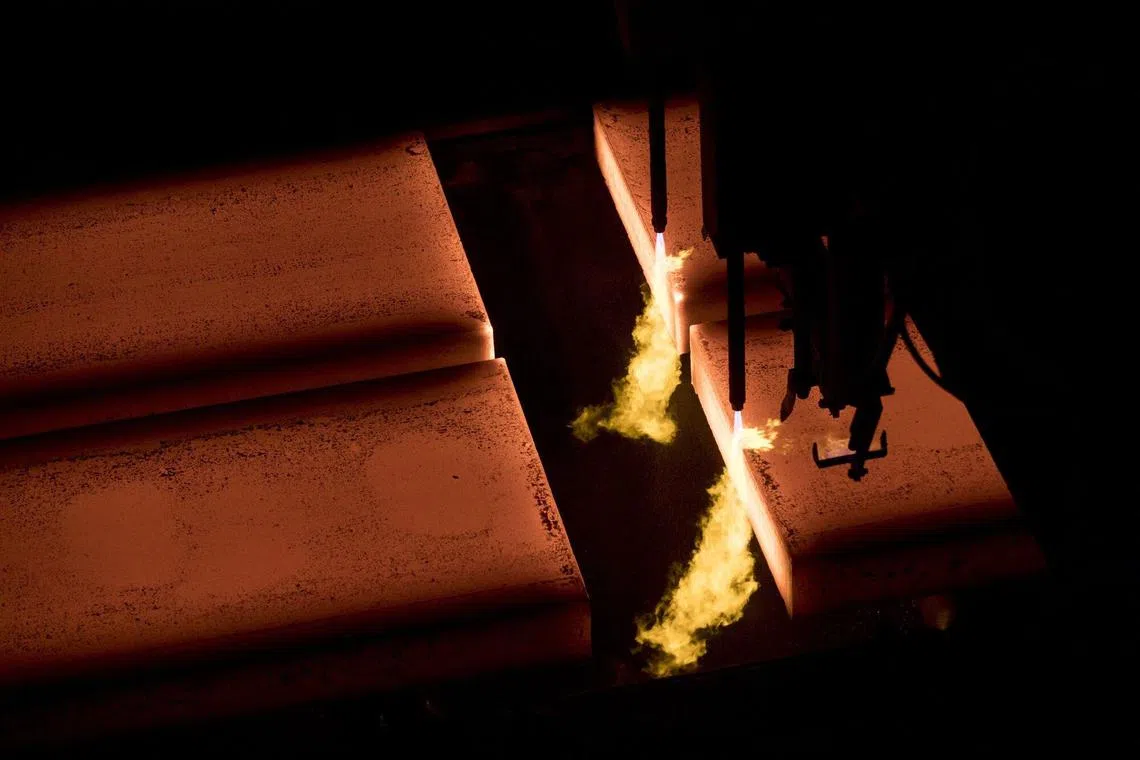Mining giants BHP and Rio team up to develop Australia ‘green’ steel pilot project
Sign up now: Get insights on Asia's fast-moving developments

BHP Group and Rio Tinto Group, alongside Australia’s BlueScope Steel, will share data and research on the nascent technology that would usually be kept in-house.
PHOTO: BLOOMBERG
SYDNEY – The world’s two biggest miners are teaming up in a bid to develop Australia’s first electric-smelting furnace, in what could prove an important step toward slashing emissions in the steel-making process.
BHP Group and Rio Tinto Group, alongside Australia’s BlueScope Steel, will share data and research on the nascent technology that would usually be kept in-house. A pre-feasibility study is being launched to assess a location for a pilot facility, which could be commissioned as early as 2027, the companies said in a joint statement.
The collaboration was announced on Feb 9 at a press conference held at BlueScope’s Port Kembla steel mill south of Sydney.
It aims to solve two major issues for BHP and Rio – commercialising their lower-grade iron ore from Western Australia’s Pilbara region, which has contaminants such as silica; and capitalising on growing demand for “green” metals as countries look to meet emissions’ reduction targets.
“The carbon intensity of iron and steelmaking requires profound change to meet the needs of our planet and our climate objectives,” Rio Tinto Iron Ore Chief Executive Officer Mr Simon Trott said in the statement. “We must find better ways to enable these materials to be made more sustainably through leveraging technology.”
The venture aims to replace the emissions-intensive coking coal usually crucial in the steelmaking process, using renewable power during the Direct Reduced Iron process. If the deployment is successful, it could pave a way for use in steel mills globally, including those in China.
Rio, BHP and Fortescue Metals Group produce almost two-thirds of the world’s seaborne iron ore from Western Australia. Typical iron ore from the region has a grade of between 56 per cent and 62 per cent, making it largely unsuitable for producing direct reduced iron – a material produced by deploying natural gas to remove oxygen from premium ores.
Feb 9’s announcement, which did not disclose financial details on the pact, is a boost to Australia’s bid to become a major player in greener steel-making. Those plans took a hit in October when Shell pulled out of a green hydrogen venture with Bluescope, saying the Port Kembla project was not a “strategic fit”.
Last blast furnace
The Port Kembla steelworks, which dates back almost a century, houses what will be the last blast furnace in Australia when Mr Sanjeev Gupta’s Whyalla in South Australia phases out coal-based steelmaking from 2025.
The parties will assess several locations in Australia for the proposed pilot facility, they said. The plant is unlikely to be operational before 2030, BlueScope’s CEO for Australian steel products, Ms Tania Archibald, said at the press conference.
According to the companies, the new process could cut CO2 emission intensity by 80 per cent compared with the conventional blast furnace steel route.
“Combining our expertise, we hope to help fast track near-zero emission-intensity pathways for steelmakers using Pilbara ores,” BHP’s Western Australia iron ore chief Mr Tim Day said in the statement.
“Technology pathways compatible with renewable energy and scalable to the order of hundreds of millions of tons of steel production would be a major step forward.”
At least 70 per cent of steel is currently produced using an energy-intensive process: metallurgical coal is heated to create coke, which is then used in a blast furnace to melt iron ore at temperatures of more than 1,800 deg C. That creates about two tons of carbon dioxide for each ton of liquid steel, according to Rio.
The world’s first fossil-free steel is being created by a venture in Sweden that uses green hydrogen instead of coal. Deliveries of the clean metal started in August with customers including Volvo Car and Mercedes-Benz Group and Finland’s Cargotec. BLOOMBERG


